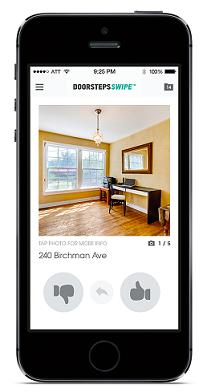I’m on a flight to Austin today for what promises to be an interesting first trip of 2019. And thinking about the January Red Dot, which led to this post. I thought it was amusing enough to share with you all. I actually think this is a pretty legitimate business idea, and if one of you decides to startup a company to pursue it, I expect you to give me a call. 🙂
OK, remember my post about the tinderization of real estate? I started thinking about taking that model and actually applying it to real estate. Half-measures have been attempted before, without much success, but I think maybe the issue was that they were half-measures that started with the wrong question: “What’s good for real estate brokers and agents?” What if you started with the right question: “What’s good for consumers?” and went from there?
So, hear me out on this random idea about “HomeDate” — no idea if that name is available or not. If nothing else, it’ll be fun and hopefully make you think about why HomeDate would not work, or is bad for consumers, or whatever.
Previous Attempts
First, I do have to talk a bit about previous “tinderization” attempts.
You have Flip, which the portal Estately launched back in 2014:
To be fair, Zillow, Redfin and most other competing apps also give you the option hide homes from your searches, but none of those are as much fun and satisfying as using the new Flip feature in Estately’s app.
Besides trashing ugly houses, though, you can obviously also swipe the other way and favorite a home, too. “Over 50% of Tinder’s users are 24 years of age and older,” the Estately team argues.” Flip makes perfect sense as the ideal format for first time home buyers who average 30-32 years of age.”
 Then you have Doorsteps, which was acquired by Move in 2013, and released a similar “tinder-like” swipe-right-swipe-left app in 2014:
Then you have Doorsteps, which was acquired by Move in 2013, and released a similar “tinder-like” swipe-right-swipe-left app in 2014:
Instead of asking buyers to input criteria like their desired school quality and lot size, Doorsteps Swipe nudges users into the search process by showing exterior shots and addresses of listings and asking them to either “like” or dismiss the listings based on that content alone.
Users may swipe right or click a thumbs-up icon to “like” a listing, and may swipe left or click a thumbs-down icon to dismiss it. After a user likes five listings, the app then offers the option to view reports that show the average price, number of bedrooms and year built of the listings they liked.
There have been others, but in 2019, you’d be hard pressed to think about a swipe-right-swipe-left type of home search experience, even in mobile apps which is presumably where all of the action has been. Why?
The simple explanation is the best, and the best explanation is that consumers instinctively understand that this kind of “real estate tinder experience” is just a way to search for homes, then either submit a traditional inquiry to some real estate agent (and we know from Zillow that half of those inquiries go unanswered), or get bombarded by sales calls and emails. It’s strictly one-way, with buyers searching for homes. The end goal of that search is to generate a lead for a real estate agent.
That’s not how dating platforms work. Imagine if Tinder, Bumble, Match.com, and such were all operated for the benefit of professional matchmakers. I daresay no one would use such an app, because there are three problems, which becomes obvious if we apply the real estate search to dating.
What If Online Dating Were Like Real Estate Search?
Imagine if every online dating platform worked the way real estate search works.
Everyone who wants to date would hire a matchmaker, who takes down all kinds of information about you, gets a professional photographer to take headshots and “candids” that are anything but candid, and then has you change your entire wardrobe, take dance lessons, and get a better job. But that’s only if you want somebody else to make the first move; you’ll “list” yourself and wait for inquiries to roll in. While human behavior has changed in recent decades, we can go ahead and stereotype this as the typical “female” approach to dating, though I do know a few men who do this “look great and wait for them” thing, and one or two women who are more proactive.

If, on the other hand, you want to be the initiator, then you don’t create a profile, you don’t hire a matchmaker, and just go to Match and Tinder. You browse photos of whatever gender you’re interested in, with search criteria: location, income level, education level, languages spoken, etc. etc. Whatever is important to you, you fill that stuff in, and then hit “Search”. Photos start showing up, but when you go to look at details, there are photos and contact information of 3-4 Premier Matchmakers who can help you with information on the person you might be interested in. Should he or she prove to be a no-go, the matchmaker has access to ALL of the singles on the market in the area you’ve searched, and would happily set you up on a drip email whenever a new single hits the market, as well as weekly (daily?) emails of all the singles still on the market whom you may or may not have seen already and may and may not have rejected already.
The listing single, meanwhile, sits at home waiting for the phone to ring with her matchmaker on the line saying, “Okay, we have seventeen matches from eligible bachelors!” If activity dries up, our single is nervous, anxious, and maybe even panicked. Why isn’t she getting any offers? There have been plenty of views, and even first dates, but no offers of a more serious relationship. Granted, the first dates were awkward, because her matchmaker had to be present as well as his matchmaker, to make sure that everything was copacetic, and they could only ask questions of each other through their matchmakers, but there have been first dates. Why no offers?
Her matchmaker advises her to lower her price standards, and keep dropping it every six weeks, until a match can be made. Meanwhile, you’re not even sure if your matchmaker is sending you everyone who has swiped right on you.
On the other side, the guy is wondering if all of the offers he’s sent out have even been presented to his prospective sweetheart. He knows none have been accepted, but he’s not sure why. One matchmaker was nice enough to tell him one reason: “Oh, you’re a wonderful guy, but she had an offer from a hedge fund billionaire with a home in Aspen. Maybe if you were more realistic about what you can afford?” But everybody else? Just silence.
No one in his or her right mind would subject himself or herself to that process.
What makes online dating platforms and apps so addicting and so effective (if it is effective), are two things that real estate search misses: immediacy, and two-way selection.
Immediacy
Prior to the rise of online dating, the process was time-consuming, expensive, and filled with uncertainty. (Sound familiar?) Usually, you had to go out somewhere — a bar, a nightclub, a friend’s house, somewhere where you might meet someone single. Or maybe it was a setup through a friend. Either way, you had to dress up, put on makeup or shave or whatever it is that guys do, go out, see someone, make a move (“Bust A Move!” being a song that I’m not sure Millennials can understand), get rejected, etc. etc. and repeat the process until someone you approach indicates that he or she likes you back enough to give you a phone number or some such thing.
Those of us who came up in that world look at the modern world of online dating with a mixture of fascination and horror. But those who grew up with Tinder and the like must look at how we did things back in the 80s and 90s like we look at people who lived without running water. If your goal is to find potential dates and mates, online dating offers a level of immediacy and convenience that the Old School ways simply can’t match.
This immediacy explains why online real estate search took over as it did.
Two-Way Selection
The real missing piece, however, is two-way selection. That is, in order for a match to be made, both the buyer (the initiator) and the seller (the contacted) have to choose to meet with each other. There is approval from both sides where he (and let’s be honest… it’s usually a he) indicates, “You’re pretty!” and she responds, “You don’t seem like a loser.”
The swipe-right mechanic works because for a match to be made, BOTH parties have swiped right or indicated approval in some other way of the other person. If you keep swiping right, and no one swipes right on you, then well… you know you’ve got some work to do.
So, let’s implement this two-way approval into a real estate search app.
HomeDate: How It Works
Basically, both the home seller and the home buyer setup profiles. The home seller puts up a listing of the house he is looking to sell. The buyer sets up a profile that can range from basic to detailed, with information about demographics (age, education, family information, etc.), financials (income, DTI ratio, any pre-approved mortgage limits, etc.), important deal terms (contingencies, etc.) and whatever else.
The rest of it works like Tinder. Both the buyer and the seller swipe.
The buyer gets to see a list of properties for sale, just like Doorsteps or Flip did. But that’s just one-way and results in contact with a real estate agent.
In HomeDate, the seller gets to see a list of buyers who are interested in that area. And the seller can swipe on “attractive” buyers as well.
Because this is commerce, instead of dating, HomeDate would provide an option to buyers and sellers to be notified if anybody swiped right on them even if they themselves did not swipe right on the counter-party. In dating, you don’t want to know about people who you would never date liking you. In commerce, maybe you really do want to know what kind of buyers are interested in your house, or what kinds of homeowners think you’re perfect for their house.
Obviously, this can work great for tenants and landlords as well. The two-way selection, the two-way approval, is the key to the whole thing.
Like online dating, when there’s a match, HomeDate allows direct communication between the two parties. A lot of initial interest might stop right there if a quick text exchange reveals problems that can’t be overcome. There’s no point in progressing to a first date, which for us is a home tour, if that house (or that buyer) will never ever do. So message each other, ask some basic important questions, and then if things look okay, proceed to the first date.
This feels like the right place for real estate professionals to get involved.
HomeDate and the Real Estate Professional
As you can probably tell, so far, HomeDate seems like a giant FSBO platform. But everything I’ve ever read and every agent I have ever known says that the consumer works with a real estate agent because of the value they get from a professional, disinterested local expert who has done this a time or two. That doesn’t change, and no technology will ever change that.
So once the buyer and the seller have matched, and exchanged some basic information back and forth, and decided that they should proceed to a home tour (a first date), that seems like a pretty good place for a professional to get involved.
HomeDate would urge both the buyer and the seller to find representation, or if they already have an agent they’re working with, now’s a good time to bring them into the transaction. The buyer might want his agent along for the home tour, or choose to wait until “it gets more serious.” The seller might want the listing agent present at the tour, or again, choose to wait until it gets more serious.
The agents don’t end up wasting a ton of time with buyers who are just kicking the tire and sellers who aren’t all that thrilled about this buyer with numerous contingencies and not enough cash who keeps reassuring them that their great uncle is a millionaire. But hey, if the kids are pretty serious about this first date (home tour) then they can get involved to provide advice, local expertise, and the rest of the stuff that agents do for their clients.
 Note that the homeowner is quite likely to have a listing agent already, who helped her with the property description, the listing, professional photos, staging, repairs, and the like. But the listing agent doesn’t have to do all of the screening, tours, and negotiating with buyers who have no chance of buying the client’s house. Plus, the homeowner would get the feedback from the market directly, which could help her figure out that nobody other than her and her AD&D group loves her amazing fireplace. Her agent doesn’t have to have that painful, difficult conversation that can injure the relationship.
Note that the homeowner is quite likely to have a listing agent already, who helped her with the property description, the listing, professional photos, staging, repairs, and the like. But the listing agent doesn’t have to do all of the screening, tours, and negotiating with buyers who have no chance of buying the client’s house. Plus, the homeowner would get the feedback from the market directly, which could help her figure out that nobody other than her and her AD&D group loves her amazing fireplace. Her agent doesn’t have to have that painful, difficult conversation that can injure the relationship.
More fundamentally, the HomeDate approach puts the onus of communication on both principals, who have mutually approved each other, after all. The real estate agent is not a go-between or a middleman, but a counselor, an advisor, who will help you negotiate the best deal possible with the partner of your choice from start to finish.
All of the unhappiness with professionals go right out the window. Think about consumer complaints about agents:
- They don’t return my emails and calls. Much of that comes from consumer anxiety: “What’s going on with the listing? What’s happening with my offer? Did you send it? What did they say?” and so on. With HomeDate, you have the freedom to communicate with your chosen homeowner or buyer directly. Your agents are copied on all of that, so they can intervene to protect you from yourself, but sending messages back and forth is not the agent’s problem.
- “I feel like my agent pressured me to sell too quickly.” The seller swiped right on a bunch of potential buyers, had first dates with a number of them, and then chose the best offer (with the guidance and advice of her agent) by her own standards. She saw the options that are out there, and the range of potential buyers and their offers. Her agent advised her, as is his job and duty, but she made the choice knowing what’s out there. Don’t blame the agent!
- “My agent keeps recommending houses I can’t afford.” It isn’t your agent but the homeowners swiping right on you who drive the whole process. Maybe you need to look at your Buyer Profile on HomeDate and be more honest with yourself and with homeowners?
Seems like a win for real estate professionals who want to be seen as professionals, counselors, advisors who don’t want to waste a lot of time with tire-kickers, unrealistic expectations, and the like.
Miscellaneous
There are interesting other things that HomeDate could produce. Buyer behavior data would be absolutely fascinating, but so would seller behavior data: who do homeowners choose to swipe right on, and why?
Buyer agents could develop a new consultative practice to help their clients setup their Buyer Profiles for maximum effectiveness. It’s like the “Buyer love letter” taken to the next level.
We can actually do a lot of A/B testing and get near-instant feedback. Did changing the primary listing photo result in more swipe-rights? Dropping the price by $5,000 resulted in 200% more swipe-rights from buyers out there. Waiving an inspection contingency makes you 30% more attractive to homeowners in your target area, true or false? Stuff like this can be tested and measured.
Would buyers put their information into HomeDate? I think so. There is something deep in human nature that wants approval and acceptance, even by total strangers. How else to explain Facebook and Instagram? Today, there’s no reason to put your Buyer Profile anywhere; only your agent gets to see that. But the tiny thrill of seeing homeowners swipe right on you would quickly make HomeDate addictive in a similar way to online dating apps. (There are studies that show quite a few people get on dating apps without ever going on a date, because they want the affirmation of being swiped right on.)
Ok, It Might Not Work… But Then Ask Why Not
I’m writing this using in-flight wifi, because it’s fun. But still, I tried to present some arguments as to why a HomeDate or something like that with two-way selection could revolutionize real estate search. Chances are, it won’t work. Either it’s been tried before and the market didn’t care for it, or there may be deep flaws with this flow of ideas.
But the really interesting question comes after raising objection after objection about HomeDate. Whatever your objection, I’d want to know if that objection is based on something fundamental, like human nature, or something artificial and circumstantial, like MLS data rules. Because the latter can be changed, while the former is probably eternal.
Thinking about your objections to HomeDate might be more useful as a way to analyze the assumptions of and barriers in place in the real estate industry than the app itself would be.
But still, if you decide to build this app, I expect a phone call. 🙂 Carry on, everybody! Flight is landing soon; gotta go.
-rsh



3 thoughts on “HomeDate: In Which I Offer a Free Idea for Tech Entrepreneurs”
Oh dear God! That is the nicest thing I could possibly say, so I won’t say anything else.
“This Doctor Frasier Crane. I’m listening…”
~rsh, I just wanted to let you know “great song choice.” My close childhood friend is Michale Ross (created delicious vinyl) And of course, The Brand New Heavies, Tone Loc, and Young MC, were the three big artists on his lable…
Ha, I like that you are thinking outside the real estate box but the legal ramifications of what you are proposing will keep attorneys busy for a long time. And your use of the word “professional” when describing the real estate agents in consumers complaints is like calling Jeffrey Dahmer a food critic.
Comments are closed.